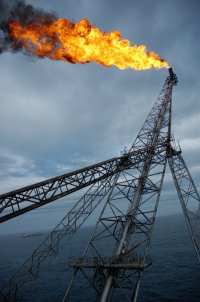Atmospher Sci & Global Chg
Research Highlights
March 2012
Methane Mitigation Seminar for Russia's Oil and Gas Production
A seminar led by the U.S. Environmental Protection Agency and Pacific Northwest National Laboratory marked the culmination of a four-year-long effort to raise awareness of methane gas emissions in Russia. Under the framework of the Global Methane Initiative, the seminar brought together several of Russia's leading oil and gas companies in partnership with researchers at the Joint Global Change Research Institute, the U.S. EPA, and support from the World Wildlife Fund-Russia to exchange knowledge of internationally proven and cost-effective methane reduction technologies and practices. As a result of this ongoing collaboration, Russian oil and gas companies have begun to place greater importance on examining their production systems to optimize operational performance and reduce methane emissions. The seminar was held in Moscow, Russia, on March 16.
Russia is the world's largest producer of both oil and natural gas. Although a relatively clean fuel, natural gas production is a significant source of human-caused methane emissions and a potent contributor to climate change. According to the Fourth Assessment Report of the Intergovernmental Panel on Climate Change, methane is 25 times stronger in trapping heat in the atmosphere, by weight, than carbon dioxide over a 100-year period. In addition to reducing environmental damages, PNNL found that reducing methane losses in the production of oil and natural gas can also be a cost-effective strategy for Russia. Methane is a valuable commodity when transported to market or used locally.
At the seminar, Gazprom, the world's largest natural gas company, and several independent oil and gas companies shared their achievements in reducing methane emissions. One presentation highlighted Russia's success in reducing emissions using vapor recovery units in gas processing plants. Participants emphasized the benefits of working on methane mitigation and sharing information on technologies, especially those relevant to Russia's harsh conditions. Many companies showed a particular interest in finding ways to use associated petroleum gas, also known as associated gas. Similar to natural gas in content, it is primarily made of methane. In recent years, Russia has seen a lot of progress in reducing emissions of this gas, but there are still substantial resources available to advance emissions reductions in this area. Participants at the seminar also stressed the value in assessing emissions as a necessary first step. Some companies, including Gazprom VNIIGAZ and Shell, noted the importance of emission detection and measurement studies.
Seminar participants addressed remaining barriers in mitigating methane emissions in Russia's oil and gas sector. Of particular interest are the marketing and access challenges regarding the sale of electricity from gas and/or accessibility of gas transmission pipelines. The seminar in Moscow signaled an important milestone. Many companies are committed to develop and share information on technologies and to take stronger cooperative action for reducing methane emissions in their oil and gas operations.
Acknowledgments: The seminar was sponsored by the U.S. Environmental Protection Agency. World Wildlife Fund-Russia, Shell-Russia and the Carnegie Moscow Center provided additional support. The Joint Global Change Research Institute is a partnership between Pacific Northwest National Laboratory and the University of Maryland.
Reference: International Energy Agency (IEA). 2011. Key World Energy Statistics. Paris: IEA; IPCC (Intergovernmental Panel on Climate Change). 2007. IPCC Fourth Assessment Report: Climate Change, 2007 (AR4).

